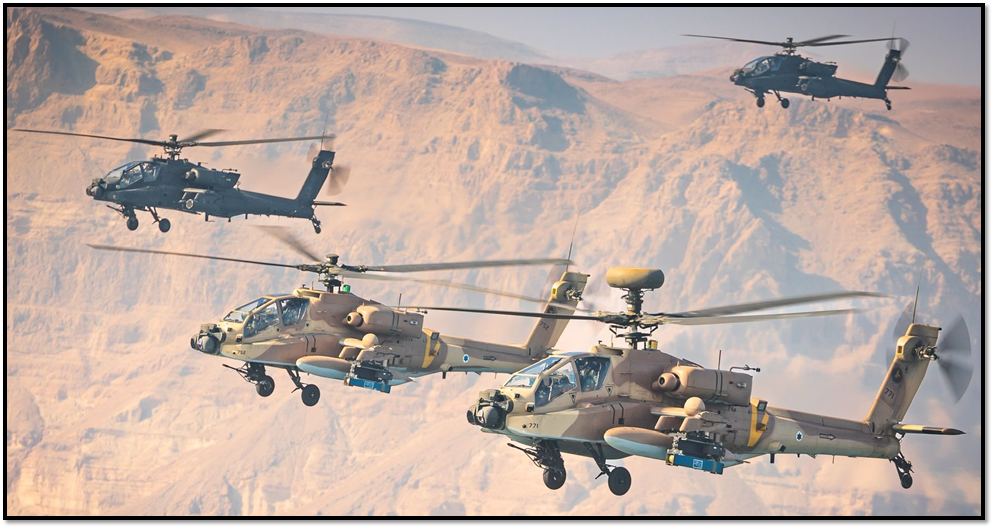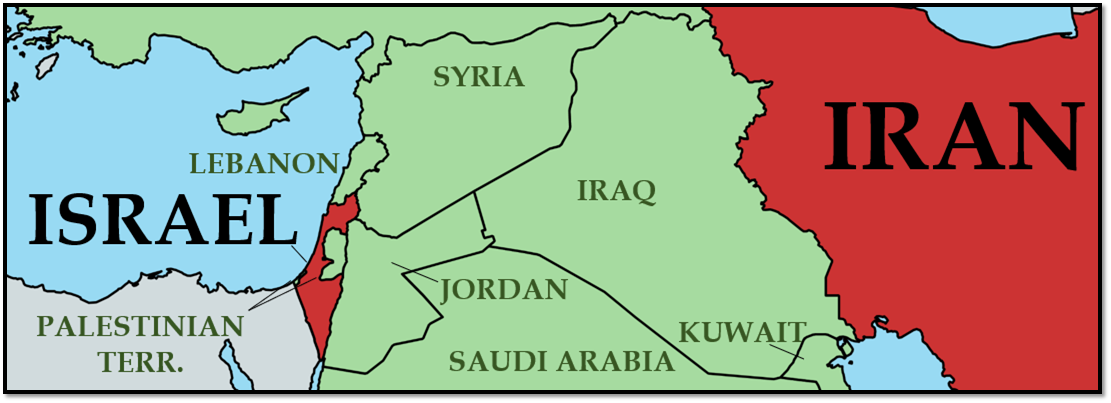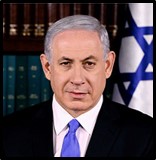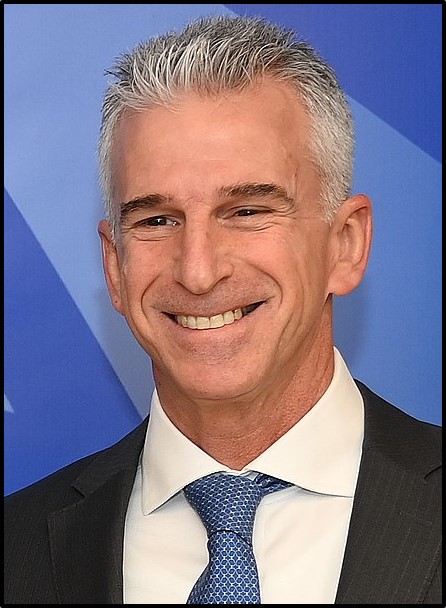For decades, Israel has considered the Islamic Republic to be its greatest adversary. Several governments, led by both the left-wing Labor Party and the right-wing Likud Party, have centered their foreign policies around the threats from Iran, ranging from its nuclear program to its creation of a network of influence across the Middle East. Israel has fought Iranian proxies on two borders—a thirty-four-day war with Hezbollah in Lebanon in 2006 and sporadic tensions with Hamas and Palestinian Islamic Jihad since the 1990s.
Four decades after Iran’s revolution, Israel’s concerns included:Increasingly accurate ballistic missiles with ranges up to 2,000 kilometers (1,250 miles) or more
Drones—capable of airstrikes, suicide missions and reconnaissance—for domestic use as well as export to Middle East allies and Russia
Arming, training, and funding proxies in Lebanon, Syria, Iraq and Yemen
Military deployments in Syria
Cyberattacks on the Israeli government, infrastructure and private businesses
Plots to kill or kidnap Israeli citizens abroad and attack cargo ships linked to Israel
 Attack helicopters in the Israeli-U.S. exercise "Juniper Oak 23" in 2023
Attack helicopters in the Israeli-U.S. exercise "Juniper Oak 23" in 2023Since the 1990s, Prime Minister Benjamin Netanyahu, Israel’s longest serving leader, has warned about the existential threat from Iran’s nuclear program. Israel’s goal has been to “thwart” its nuclear advances and “ensure Israel’s military superiority in the region,” he told lawmakers as he started his sixth term in December 2022.
Since 2013, Israel has gradually expanded the shadow war with Iran and its network of proxies. It’s dubbed the mabam—or “war between the wars”—in Hebrew. Israel reportedly conducted three operations in Syria the first year. “Our average today is more than one a week, and we crossed 52 operations in 2022,” Kohavi said in January 2023.
Netanyahu has long campaigned against the nuclear deal brokered between Iran and the world’s six major powers in 2015. Netanyahu called the deal a “historic mistake” that failed to curb Iran’s nuclear program. President Donald Trump withdrew the United States from the deal in 2018; Iran began breaching its obligations 14 months later. The Biden administration launched new diplomacy in April 2021 to get both the U.S. and Iran back into compliance with their obligations in the deal. But talks deadlocked in August 2022.
In 2021, Israel’s top military official announced that funding and preparations for an attack on Iran’s nuclear sites had “dramatically accelerated.” “It’s a very complicated job, with much more intelligence, much more operational capabilities, much more armaments,” Lt. Gen. Aviv Kohavi, then the Israel Defense Forces chief of staff, revealed in September. Israel also accelerated the pace and scope of military exercises:May 2022: For the first time, the Israeli Air Force conducted large-scale maneuvers simulating an attack on Iran’s nuclear sites.
November 2022: Israeli and U.S. forces conducted a three-day air force exercise that simulated an attack on Iran’s nuclear sites.
January 2023: Israeli F-35 stealth fighters participated in drills with six U.S. F-15 fighters. The goal was to simulate attacks deep into enemy territory.
January 2023: Israeli and U.S. forces conducted a four-day exercise in the largest joint military exercise to date. The live-fire drill included 42 Israeli aircraft and 100 U.S. fighters, bombers and other warplanes as well as a U.S. carrier strike group. Some 6,400 U.S. personnel and more than 1,100 Israeli personnel were involved.
Since 2010, Israel has been widely linked to a least a dozen attacks—involving cyber, covert operations, and assassinations—on Iran’s nuclear program. Jerusalem and Tehran are nearly 1,000 miles apart. Yet Israel has reportedly penetrated deep into Iranian territory and its most secure facilities in two waves. The first wave, mainly cyberattacks and assassinations, was between 2010 and 2012 before the launch of nuclear diplomacy with Iran. The second began in 2018 and has included a Mossad raid, sabotage and an assassination.
 In January 2023, the mounting tensions were reflected in the largest ever joint U.S.-Israeli military exercise. It was carried out by land, sea and air over four days. “Juniper Oak 23,” a live-fire drill, included 42 Israeli aircraft and 100 U.S. fighters, bombers and other warplanes as well as a U.S. carrier strike group. “We know how to defend,” Gen. Herzi Halevi, the new chief of staff of Israel's military, said on January 26. “But when someone attacks you, the best defense is to attack him back, so it is offensive capabilities, and we shape it in order to bring a very clear message to Iran: if Iran makes mistakes, offense capabilities are getting ready.” Some 6,400 U.S. personnel and 1,100 Israeli personnel participated. “The scale of the exercise is relevant to a whole range of scenarios, and Iran may draw certain inferences from that,” a U.S. official told NBC News. The exercise also deployed two KC-46 air refueling tankers, which can be used to support a long-range bombing mission.
In January 2023, the mounting tensions were reflected in the largest ever joint U.S.-Israeli military exercise. It was carried out by land, sea and air over four days. “Juniper Oak 23,” a live-fire drill, included 42 Israeli aircraft and 100 U.S. fighters, bombers and other warplanes as well as a U.S. carrier strike group. “We know how to defend,” Gen. Herzi Halevi, the new chief of staff of Israel's military, said on January 26. “But when someone attacks you, the best defense is to attack him back, so it is offensive capabilities, and we shape it in order to bring a very clear message to Iran: if Iran makes mistakes, offense capabilities are getting ready.” Some 6,400 U.S. personnel and 1,100 Israeli personnel participated. “The scale of the exercise is relevant to a whole range of scenarios, and Iran may draw certain inferences from that,” a U.S. official told NBC News. The exercise also deployed two KC-46 air refueling tankers, which can be used to support a long-range bombing mission.In early 2023, U.S. and Israeli officials estimated Iran had not yet made the political decision to produce the world’s deadliest weapon. In January, Kohavi claimed that Iran already had enough uranium that, if enriched further, could fuel four nuclear weapons—three with 20 enriched uranium and one with 60 percent enriched uranium. (The usual level of uranium enrichment for a bomb is 90 percent.) Even if Tehran did opt to weaponize its technological advances, it would need up to a year, and possibly two, to complete the multiple steps required to assemble a bomb and then marry the warhead to a missile delivery system.
The escalating tensions since the 1979 revolution are in stark contrast to the warm ties between Israel and Iran during the monarchy. For decades, Iran sold oil to Israel. Both had close ties to the United States and opposed Soviet expansion in the Middle East. Israel had a de facto embassy in Tehran, while Iran had a secret diplomatic mission in Israel. Iran broke off relations after the ouster of the shah and turned the embassy over to the Palestinian Liberation Organization. Tensions heightened after Israel’s invasion of Lebanon in 1982, when Iran dispatched some 2,000 Revolutionary Guards to Lebanon to foster the creation of Hezbollah.
The following are key remarks by Israeli military and political officials on the threats from since 2022.
Prime Minister Benjamin Netanyahu (2022- )
 Prime Minister Netanyahu
Prime Minister NetanyahuIn remarks with Secretary of State Antony Blinken on Jan. 30, 2023: “Your visit comes at an important time. It’s a time where many in the international community – I would say most of the international community – have seen the true face of Iran. They’ve seen the barbarism of this regime against its own people. They’ve seen how it exports aggression beyond its border and beyond the Middle East, and I think there is a common consensus that this regime must not acquire nuclear weapons.
We’ve had very good discussions on forging a common policy on trying to work together to thwart the danger. I can repeat again something that you’ve heard me say many times: Our policy, and my policy, is to do everything within Israel’s power to prevent Iran from acquiring nuclear weapons and the means to deliver them. And that will remain so. But obviously, the fact that we and the United States are working together is something that is important for this common goal as well.”
During the first meeting of the new cabinet on Jan. 3, 2023: The government will “work more vigorously to prevent Iranian-military entrenchment in Syria and elsewhere.”
In an interview with Al Arabiya on Dec. 19, 2022: “The problem with Iran and its proxies is that they have a completely different vision. They want to stop this progress [countries normalizing ties with Israel]. They want to dominate the Middle East, if not conquer it outright. They openly say they want to annihilate Israel. So, you know, obviously you may have a tactical agreement on the agenda on the Lebanese maritime question, but you can't really make it. What kind of an agreement would I make with Iran? The method of our decapitation? How we commit suicide? How we allow them to have a nuclear arsenal that will threaten all of us? That's not an agreement.”
President Isaac Herzog (2021-)
During a press conference with NATO Secretary General Jens Stoltenberg in Brussels on Jan. 26, 2023: “The radical Iranian regime is executing innocent citizens at home, launching attacks and undermining stability across the Middle East, spreading arms, death and terror in Europe, in Ukraine especially, and around the world, and continuing its belligerent pursuit of nuclear weapons on its quest for regional and world domination.”
“With Iran tightening its hold on European soil, the illusion of distance can no longer hold. NATO must take the strongest possible stance against the Iranian regime, including through economic, legal, and political sanctions, and credible military deterrence.”
Mossad Director David Barnea (2021- )
 Barnea of Mossad
Barnea of MossadIn a speech at the International Institute for Counter Terrorism on Sept. 12, 2022: “The Iranian leadership must understand that attacks against Israel or Israelis, directly or indirectly by proxies, will be met with a painful response against those responsible, on Iranian soil… The deal [2015 nuclear deal] is based on Iranian lies. Iran has sought to build a nuclear weapon that endangers Israel’s existence. The deal will easily help them reach this goal under international legitimization.”
IDF Chief of Staff Gen. Herzi Halevi (2023- )
In remarks after the Israeli-U.S. military exercise “Juniper 23” on Jan. 26, 2023: “We know how to defend. But when someone attacks you, the best defense is to attack him back, so it is offensive capabilities, and we shape it in order to bring a very clear message to Iran: if Iran makes mistakes, offense capabilities are getting ready.”
IDF Chief of Staff Lt. Gen. Aviv Kohavi (2019-2023)
In an exit interview with Israel Ha-Yom on Jan. 13, 2023: IDF planning “extends from a retaliatory strike on Iran that would be unrelated to the nuclear issue, to the taking out of the Iranian nuclear installations and auxiliary sites in that project, and if the situation eventually escalates into a full-fledged campaign then these plans also include the targeting of military sites and other assets.”
In an exit interview with The Jerusalem Post in January 2023:
 IDF Chief of Staff Kohavi
IDF Chief of Staff KohaviKohavi: We started [the “war between wars” campaign against Iran and its proxies] 10 years ago in 2013, and there were three attacks the whole year. Our average today is more than one a week, and we crossed 52 operations in 2022.
They still try because like in every battle – strategic or tactical – just because one side succeeds does not mean that the other side withdraws completely.
Iran still has a desire – even if they don’t actualize the entire vision of [former Qods Force commander] Qassem Soleimani, which in this sense has failed – to put weapons and advanced capabilities in Syria. Although we undermined a large portion of the plan, it doesn’t mean they have stopped trying.
We have not finished, and I don’t think [the Mabam] will finish in the next year or two. There will be more attempts, but there is no doubt that we have prevented what was supposed to be there. They wanted hundreds of surface-to-air missiles and surface-to-surface missiles. They wanted tens of thousands of militiamen and a second Hezbollah. All of this was thwarted completely.
Question: Israel used to say that it will not let Iran cross certain levels of nuclear enrichment, but they have crossed them. We said we would not let them throw out inspectors, but they did. IDF Intelligence chief Maj.-Gen. Aharon Haliva said recently that Iran might pass the weaponized 90% level soon. What changed in Israel’s red lines on Iran?
Kohavi: First of all, I don’t know what it means “we said.” We never made a red line.
Question: Netanyahu did, at the U.N.
Kohavi: No, he did not draw a red line in the sense that if they cross this specific line, then we commit to attacking.
Second, the Joint Comprehensive Plan of Action [JCPOA – the 2015 Iran nuclear deal] was signed with Iran when it already had enough nuclear material for seven potential nuclear bombs: six bombs from low-level enriched uranium and another one from 20% enriched uranium.
The situation today [is focused on] four potential bombs, even less. It is true that one of them is based on 60% enriched uranium; the distance between 60% and 20% is only a few weeks, so it does not really matter. What is important is not to allow Iran to obtain a nuclear bomb, but also not to get to the point where it can rapidly break out into a nuclear bomb within weeks.
That was, in my view, the biggest problem with the JCPOA. I thought it was a bad deal at the time, and I did not hide my view. Our responsibility in the IDF is to be ready to strike a substantial blow against the nuclear facilities and also against second-level military targets, and to be ready for a broader conflict with Iran.
This is what we did in recent years. One, we upgraded our intelligence to greatly increase the number of targets. Second, we increased the number of munitions and systems needed to attack Iran, with the process now at a peak. Third, we built operational plans. Fourth, and most important, we are training for this. We finished two drills. One was during the IDF’s War Month, and the second was at the end of November. We are about to hold a third very large exercise.
In under a year, we are going to have carried out three training exercises with dozens of aircraft, refueling aircraft and all of the operative units. In addition, we also established an Iran Department in the IDF, led by a major general. All of this speaks for itself regarding the level of preparation that we are achieving.
Question: Do you know when the attack option will be ready – in one more year? In another six months?
Kohavi: We will be ready at any point that the political echelon tells us, whether it is in the coming months, or in another year, or if it is in another three years.
In a discussion at the Institute for National Security Studies on Dec. 27, 2022: “The level of preparedness for an operation in Iran has dramatically improved. I will say more than that. The IDF will be ready for the day when an order is given to act against the nuclear program, and it will fulfill the mission that it is given.”
After meeting with U.S. National Security Advisor Jake Sullivan on Nov. 22, 2022: “We are at a critical point in time that requires the acceleration of operational plans and cooperation against Iran and its proxies in the region. The deep cooperation with our greatest friend was and continues to be a central pillar of our national security.”
National Security Advisor Tzachi Hanegbi (2022- )
In an interview on Jan. 16, 2023: “If we are abandoned, Prime Minister Netanyahu will attack Iran’s nuclear facilities.”
“The previous government also said that it was preparing the defense forces…for a situation in which we are on our own.”
“The central mission of the prime minister and his primary obligation is to ensure that Iran does not obtain nuclear weapons. The alternative to an attack is accepting a reality in which a radical regime has nuclear weapons. No Israeli leader can accept that.”
Defense Minister Yoav Gallant (2022- )
At a memorial on Jan. 22, 2022 for submarine crew members who died in 1968: “We face a long list of threats - with the Iranian threat being at the forefront - which challenge us in both nearby areas and far off areas. The submarines are insurance for the State of Israel’s security, and they have a vital hand in confronting the threats surrounding us.”
In a meeting with U.S. Secretary of Defense Lloyd Austin on Jan. 5, 2023: “We are committed to doing whatever it takes to prevent Iran from obtaining nuclear weapons that threaten the State of Israel and the entire world.”
In a statement on Aug. 31, 2022 (before taking office): “Iran has witnessed three decades of international efforts to deter its nuclear program and its military projects to dominate the Middle East. Yet no methods of action have worked so far…The only solution to stop it is to go to a military operation or to seriously threaten a military operation. Nothing else works. Everything else is just talk.”
Foreign Minister Eli Cohen (2022- )
In remarks with Secretary of State Antony Blinken on Jan. 30, 2023: “I also want to thank you, Mr. Secretary, for the United States strong commitment to preventing Iran from obtaining nuclear weapons. Unfortunately, we are in a reality where Iran is rapidly advancing towards its goal of becoming a nuclear state. The international community must act quickly and effectively against Iran’s nuclear program. Its destabilizing activities in the Middle East and its finance of terror organization, including the Revolutionary Guard, which is the largest state terror organization in the world.”
In his first speech to Israeli Foreign Ministry staff on Jan. 2, 2023: “Israel is committed to preventing Iran from obtaining military nuclear capabilities by any means. Against the background of the international consensus that the nuclear agreement with Iran is no longer relevant, alongside the strengthening of independent security capabilities for every scenario, we will concentrate on an attempt to form an international front to prevent a nuclear Iran. Iran's actions are not only reflected in its ambition to obtain nuclear weapons, but also in the long-range missile project, drones and financing of international terrorism. Members of the international community must stop burying their heads in the sand.”
Defense Minister Benny Gantz (2021-2022)
At an event for graduating Israeli Air Force pilots on Dec. 28, 2022: “Israel has significantly increased its preparedness in recent years and is preparing for the possibility of an attack on Iran… You may cross the sky to the east in two or three years and take part in an attack on nuclear sites in Iran, for which we are preparing.”
Intelligence Minister Elazar Stern (2021-2022)
In an interview with the London-based Arabic news site Elaph on February 15, 2022: Iran is “building is building forces to threaten us at our borders.”
“In the past, it was stones and slingshots, and then machine guns, and now – rockets. We must prevent this in order to prevent a war. When Iran attacks Israel from its territory – Israel will respond there by targeting the head and not just the proxies.”
Photo Credit: Netanyahu Israeli Government Website; Kohavi public domain; Barnea CC BY 2.0
Updated
January 30, 2023www.fotavgeia.blogspot.com

Δεν υπάρχουν σχόλια:
Δημοσίευση σχολίου